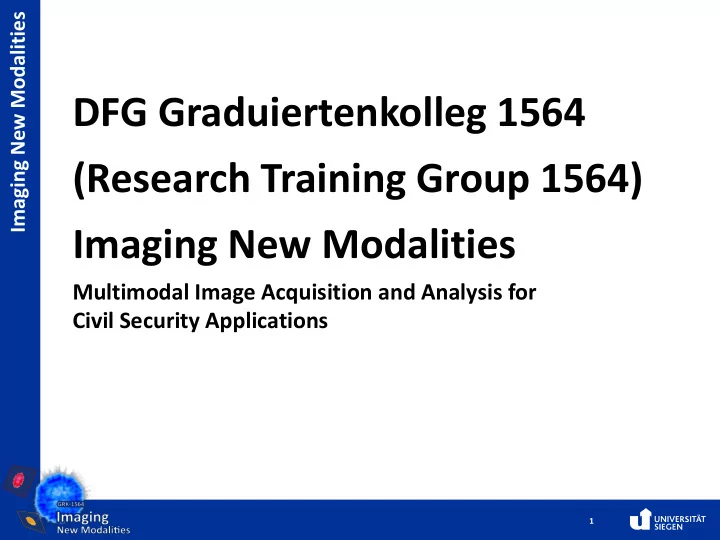

Imaging New Modalities DFG Graduiertenkolleg 1564 (Research Training Group 1564) Imaging New Modalities Multimodal Image Acquisition and Analysis for Civil Security Applications 1
Imaging New Modalities State-of-the-Art • Commercial imaging civil security systems • Based on gray-scale- or RBG-images/videos or • Microwave/X- ray („nude scanner“) or • Fluorescence- o. mass spectroscopy (chem. Detection) • Current research mainly focuses on • mono-modal approaches and • “classical” sensors • At the same time: Significant research success in • new imaging sensors • new algorithms for data processing and analysis 2
Imaging New Modalities Research Requests for Civil Security • Sensor research • Development of new fundamental sensor concepts • Concepts for integration of multi-modal systems (Goal: Functional enhancement and robustness) Modalities: Multi-spectral, THz & Range • Techniques for processing & analysis of sensor data • Data processing for new modalities • Algorithms for multi-modal sensor systems • Data security & data privacy concepts 3
Imaging New Modalities Profile of the Research Training Group • What is the scientific motivation? Integrated Research (in the civil security context) 1. new sensor techniques & sensor combinations, 2. new techniques for mono- and multi-modal data processing and analysis 3. techniques for data security & privacy • Why a Research Training Group? The structure of a Research Training Group supports 1. integration of this interdisciplinary topic, 2. teaching of complementary foundations and 3. sensitization of social aspects 4
Imaging New Modalities Scientific Environment • Long Research Tradition in Sensorics in Siegen • Faculty Electrical Engineering & Computer Science makes sensor research for some 30 years • Center for Sensor Systems (ZESS) is 20 years active • Research Foci • Classical imaging sensorics incl. chip-, camera- and application development • Further modalities: Radar, range sensors (PMD) & THz • Goal: Linking together these research areas on a level of fundamental research & combine it with • Data security and data privacy 5
Imaging New Modalities Foci of the Research Training Group Processing Sensorics & Analyis • Colorimetric Arrays • Mono-modal: New Sensors • THz-Detection • Multi-modal: New Sensor • 2D/3D Camera Technology Combinations DFG Research Training Group 1564 Imaging New Modalities • Person Detection • Data Security for Civil Security /Biometry • Security of multi-modal Data • Material Analysis • Surveillance Applications in Data Security Civil Security & Privacy 6
Imaging New Modalities Projects & Cooperations Project- Sensor Mono-modal Multi-modal Area Development Techniques Techniques Application. Personen B.1 Biometrics by Detection/ A.1 Colori- C.1 Face Recognition multi-spectral metric Arrays from 2D/3D Data Biometry Scattering Models C.3 Informationsecurity Material Analysis A.2 THz-Sensor B.2 Material Detect. Development In the THz Range Surveillance A.3 Multi-Camera B.3 Synth. Aperture C.2 Visual Analysis 2D/3D Technology in the THz Range of multi-modal Data 7
Imaging New Modalities Project Managers • Prof. Dr. rer. nat. Volker Blanz - B1, B2, C1, C2 • Prof. Dr.-Ing. Markus Böhm - A1 • Prof. Dr.-Ing. Peter Haring Bolívar - A2, B2, B3 • Prof. Dr.-Ing. Andreas Kolb - A3, B1, C2, C3 • Prof. Dr.-Ing. Otmar Loffeld - A1, A3, B3 • Prof. Dr. rer. nat. Ullrich Pfeiffer - A2 • Prof. Dr. rer. nat. Christoph Ruland - C1, C3 • JProf. Dr.-Ing. Marcin Grzegorzek - B2, C1, C2 8
Imaging New Modalities Study Programme: Scientific Course • Introductory Courses • Complementary to prior work • Mandatory: Information Security • Courses at Research Level • Address specific research topics • Guest researchers 9
Imaging New Modalities Study Programme: Soft Skills • Classical Soft-Skills, e.g. • Languages, Law, Economy [KoSI, Competence Center of the University] • Scientific Soft Skills • Ethics (IZEW, University of Tübingen) • Ethical Foundations in Research • Evaluation of own Project 10
Imaging New Modalities Study Programme: Group Seminar • Regular Meeting, every 2-3 weeks • Informal exchange & presentations of research results • GRK members can/shall quote topics for the meeting • Open informal atmosphere for discussions • Rehearsals for presentations at conferences • Further elements of “intra - professional exchange” • Introduction of the web-based platform (Wiki) for planning and information collection • Excursions 11
Imaging New Modalities Study Programme: Doctoral Seminar • Bi-yearly formal meeting – “Spring Presentations” / “Fall Presentations” with IPP and MOSES • Goal: Development/evolution of research plan • Determine individual goals • Presentation of latest results • “Fall Presentations” have “ c onference style” 12
Imaging New Modalities Thank you for your attention 13
Recommend
More recommend